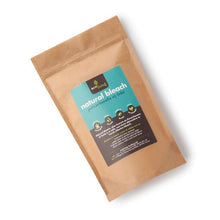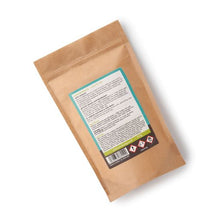This natural bleach releases oxygen when dissolved in water, which then acts as a powerful stain remover, deodoriser and disinfectant. It brightens whites and coloured fabrics and prevents them from yellowing. It can also be used in the bathroom to disinfect the toilet and clean drains.
A safe and non-toxic, biodegradable alternative to harsh chlorine bleach, it is also known as oxygen bleach or Percarbonate of Soda. After use, it breaks down harmlessly to oxygen, water and sodium carbonate.
750g
Made in the EU, plastic-free packaging, vegan.
Storage: in a closed container, in a cool, dry place. Keep out of reach of children.
Directions for Use
Stain remover
Use 2-4 tablespoons in a bowl of warm water as a pre-soak to remove stains. As a stain-removal booster, add 2 tablespoon (or 4 tablespoons for tougher stains) to the laundry powder in your washing machine dispenser drawer to brighten whites and eliminate odours.
General cleaner and disinfectant
To make the solution - Add 4 tablespoons in 1 Litre of hot water. Brilliant to clean ovens, bins and toilets. For wood: brush with the solution, wait for 10 to 15 minutes then brush again and rinse well. For Stone: Apply solution and rinse well particularly on limestone, marble slabs, etc.
To unblock and clean a sink drain:
Pour 2-3 tablespoons in the hole of your sink, add boiling water on top. Wait few minutes and rinse.
Pour 2-3 tablespoons in the hole of your sink, add boiling water on top. Wait few minutes and rinse.
Ingredients: Sodium carbonate peroxyhydrate > 90% made with soda crystals added to hydrogen peroxide. These components are resulting from natural raw materials (salt, water, chalk).
Packaging: Resealable kraft paper bag and home compostable plant-based film. This is home compostable after use. Otherwise, please check with your local authority as to which bin it should go in. In South Cambridgeshire and Cambridge City, it should be placed in the black waste bin (not the recycling bin). This waste undergoes a six to eight week composting process before going to landfill, during which time the sponge should break down, significantly reducing the waste that goes to landfill.
Customer Reviews
Based on 1 review
Write a review




